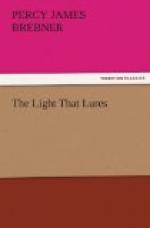He had been born in stirring times. For more than five years past war had been in the land, the struggle for freedom against a blind and tyrannical government. It had been one thing to make the Declaration of Independence, it had been quite another matter to carry it into effect. Early success had been followed by disasters. Washington had been defeated on Long Island; his heroic endeavor to save Philadelphia by the battle of Brandywine against an enemy far superior in numbers had failed; yet a month later a large British force had been compelled to surrender at Saratoga. These fighters for freedom seemed to know defeat only as a foundation upon which to build victory. England might send fresh armies and fresh fleets, but there were men on land and sea ready to oppose them, ready to die for the freedom they desired and the independence they had proclaimed; and it was only a few months ago that the war had been virtually ended by the surrender of Lord Cornwallis at Yorktown.
Colonel Barrington had taken an active and honorable part in the conflict, yet in the beginning of the trouble, like many another man of his class, he had been for peace, for arbitration, for arrangement if possible. His fathers had been among the earliest settlers in Virginia, representatives of an English family, whose roots stretched far back into history. They had come to rest on this very spot of earth, had raised their first rough wooden dwelling here, calling it Broadmead, after the name of their home in England. Love for the old country was still alive in Colonel Barrington, and it was only after grave deliberation that he had drawn the sword, convinced that he drew it for the right. Doubtless there were some in this great conflict who were self-seeking, but this was certainly not the case with Henry Barrington. He had much to lose, nothing personal to win which seemed to him of any consequence. Broadmead he loved. He had been born there. In due time he had brought home to it his beautiful young wife, daughter of a French family in Louisiana, and until this upheaval the years had passed happily, almost uneventfully, yet bringing with them increasing prosperity.




